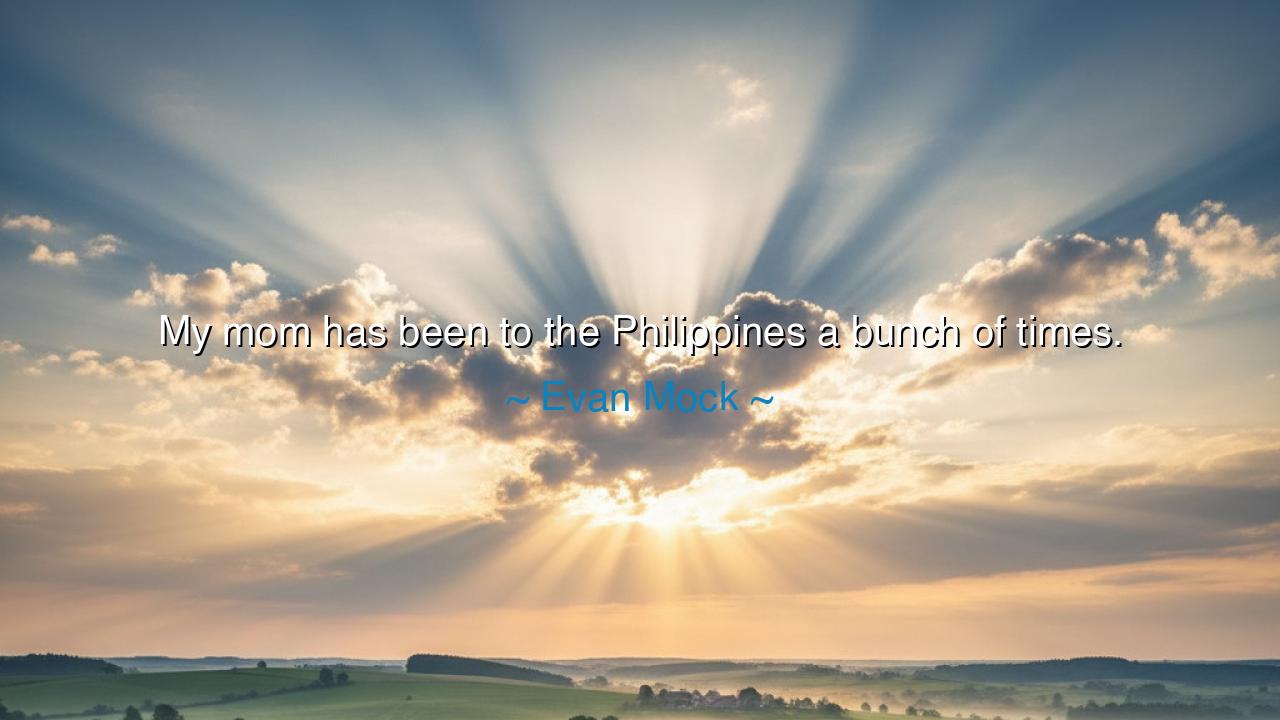
My mom has been to the Philippines a bunch of times.






When Evan Mock said, “My mom has been to the Philippines a bunch of times,” the simplicity of his words conceals a quiet current of heritage, connection, and belonging. It is not merely a statement about travel — it is a reflection of how love and memory cross oceans, how family becomes the vessel that carries our identity through generations. His words echo the age-old truth that our roots are not just places on a map, but living threads woven through the choices, journeys, and affections of those who came before us.
In the ancient world, lineage and homeland were sacred. The Greeks spoke of the nostos, the longing for return — not just to one’s home, but to one’s origins. When Mock recalls his mother’s journeys to the Philippines, it is as if he is tracing her footsteps back to the source of their family’s story. Each visit becomes a pilgrimage of remembrance, a reaffirmation of who they are. It is a gentle honoring of ancestry, spoken not with grandeur, but with warmth — a quiet acknowledgment that even in modern times, the call of one’s homeland still whispers through blood and memory.
There is also something profoundly maternal in this act. The mother in every age has been the keeper of the family’s soul — she carries not only the child, but the culture, the tongue, the rhythm of an older world. When Evan Mock speaks of his mother visiting the Philippines, he hints at that timeless role: the woman who preserves the bridge between generations, ensuring that even if her children live far from their ancestral soil, they will never be strangers to it. She travels not for leisure alone, but as a bearer of legacy — one who keeps the flame of origin alive.
The Romans had a saying: “A man without his history is like a tree without roots.” Many who leave their homeland grow tall and successful, yet they risk forgetting the soil that once nourished them. Mock’s words remind us of the balance between modernity and memory, between progress and remembrance. His mother’s repeated journeys symbolize the sacred act of returning — returning not just to a place, but to a story, a scent, a way of being. It is through such returns that identity remains whole.
Consider the story of José Rizal, the Filipino national hero, who spent years abroad yet carried his homeland in every heartbeat. Even from distant lands, he wrote words that stirred his people to remember who they were. His life teaches that no matter how far one travels, the homeland remains within — in gestures, in values, in the quiet pride of origin. In a gentler, more personal way, Mock’s quote reflects that same continuity: that love for one’s roots need not be shouted; it can live quietly through the choices and memories of a family.
The deeper lesson here is one of gratitude and awareness. Many today are born between worlds — children of migrations, raised in cultures layered with different songs and symbols. Yet through our parents and elders, we are given the chance to reconnect, to rediscover what shaped us. When we honor their stories, we reclaim a piece of our own. Mock’s words are a gentle invitation: to ask, to listen, to learn where we come from — for only then can we understand where we are going.
And so, let this truth be passed down: never forget the lands that shaped your blood, nor the people who carried you toward them. Visit them in person, or in spirit, but always return — even if only in your heart. For the journeys of our parents are not separate from our own; they are the first chapters of the same story. In remembering their footsteps, we remember ourselves — and in doing so, we keep the ancient bond between past and future alive.






AAdministratorAdministrator
Welcome, honored guests. Please leave a comment, we will respond soon